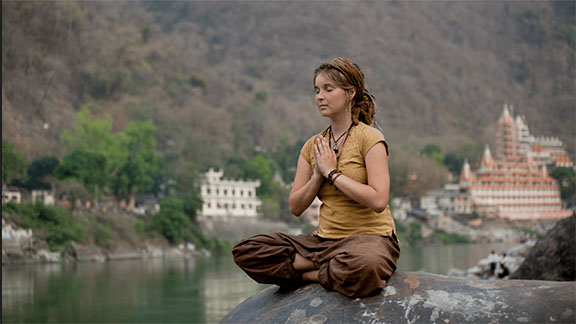 Meditation is more or less the final practice in the yogic ladder. Patanjali talks about the eight steps of Ashtanga Yoga. The eighth step is an experience; we are not doing anything. But the first seven start with Yama and Niyama; thinking and handling your day to day life. Then comes asana or physical postures, and pranayama, the breathing techniques. Next is pratyahara, keeping control over your senses and dharana, trying to fix the mind on one thing at a time. After you do all these things, then the seventh step is what you call meditation. That means that the preparation for meditation is very important. Without any of these seven preparations, meditation will be a constant struggle.
Meditation is more or less the final practice in the yogic ladder. Patanjali talks about the eight steps of Ashtanga Yoga. The eighth step is an experience; we are not doing anything. But the first seven start with Yama and Niyama; thinking and handling your day to day life. Then comes asana or physical postures, and pranayama, the breathing techniques. Next is pratyahara, keeping control over your senses and dharana, trying to fix the mind on one thing at a time. After you do all these things, then the seventh step is what you call meditation. That means that the preparation for meditation is very important. Without any of these seven preparations, meditation will be a constant struggle.
If thoughts come and interfere with your meditation, you should know where they are coming from and why are they coming. They are coming from your day to day life. If you have a lot of anxieties, engagements, appointments, a lot of interest in little things, they all come with you when you sit and want to meditate. You have not disposed of them, or, you have not risen above those things. The anxieties, worries, and fears in daily life will create the images in your meditations. That’s why the Yamas and Niyamas say to keep a balanced mind: Don’t be greedy, love everyone equally, don’t be selfish. Whatever you do, do it in the name of God: Ishvara Pranidanam.
The moment we think of Yoga, immediately we want to stand on the head or do some bellows breathing and we think that’s all there is to Yoga. No. Even if you don’t do any of those things, let your life be anxiety free, completely selfless. The person who leads a selfless life need not even meditate because the life itself becomes a meditation. The selfless person’s mind never gets agitated over anything, it’s always calm. If the mind is not calm, it’s because you are not practicing meditation properly.
Live a balanced, contented life. That’s why we sometimes use the devotional approach where we leave it all to God. In this approach you think: It’s all God, and when God wants to give me something, God will give it to me or will take away something. I just do my part. If I do my part, whatever is due to me will come. If something is not due to me, it won’t come. If your life is balanced and contented, your mind remains peaceful at all times. When your mind remains peaceful you are in meditation.
The purpose of meditation is to make the mind calm. So, every action should be done in such a way that it does not disturb your peace. That is the point to be noted. Whatever you do in your life, before you even begin to do it, ask the question: Will this disturb my mind? If the answer is yes, don’t do it, or, correct the attitude with which you are doing it.

